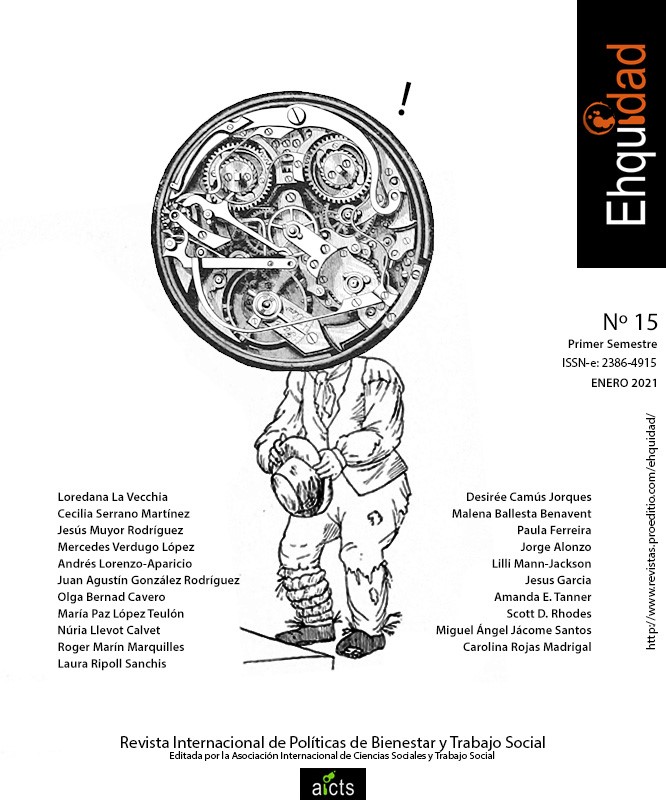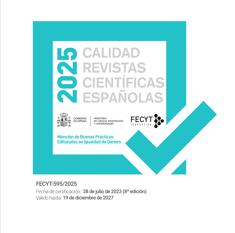Simulations as a teaching strategy in Social Work training
DOI:
https://doi.org/10.15257/ehquidad.2021.0011Keywords:
Vocational training, University teaching, Cultural-historical theory, Simulation, Teaching, strategiesAbstract
This paper is about the experience of situated simulations, which is a strategy for the training of students of Social Work. The strategy has been basing on the student-centered approach; the cultural-historical theory and its contribution to situated learning. The simulations demand the previous approximation of basic theoretical, methodological, ethical and technical elements, to later face the simulated cases in situ with this information. In the evaluations implemented in 2017, 2018 and 2019, the students visualize the simulations as an appropriate and challenging strategy, which allows a more dynamic understanding of the knowledge provided in the course, through a practical approach to situations they will face in their future professional practice.
Downloads
References
Brydges, R., Manzone, J., Shanks, D., Hatala, R., Hamstra, S., Zendejas, B. y Cook, D. (2015). Self‐regulated learning in simulation‐based training: a systematic review and meta‐analysis. Medical education, 49 (4), 368-378.
Carlino, P. (2015). Alfabetización académica diez años después. Revista mexicana de investigación educativa, 18 (57) 355-381.
Cetina-Sauri, G., Huchim-Lara, O., Alvarez-Baeza, A., Inurreta-Díaz, M., Puga-Matu, H., Aguilar-Vargas, E. y Méndez-Domínguez, N. (2020). Undergraduate medical students. Simulation-based activity to conduct the informed consent process for health research studies, Educación Médica, 21 (2), 106–111. https://doi.org/10.1016/j.edumed.2018.05.015
Cheng, A., Morse, K., Rudolph, J., Arab, A., Runnacles, J. y Eppich, W. (2016). Learner-centered debriefing for health care simulation education: lessons for faculty development. Simulation in Healthcare, 11 (1), 32-40.
Conigliaro, R. L., Peterson, K. D. y Stratton, T. D. (2020). Lack of Diversity in Simulation Technology. Simulation in Healthcare. The Journal of the Society for Simulation in Healthcare, 15 (2), 112–114. https://doi.org/10.1097/sih.0000000000000405
De Zubiría, M. (2007). Enfoques pedagógicos y didácticas contemporáneas. Bogotá, Fundación Internacional de Pedagogía Conceptual Alberto Merani.
Díaz Barriga, F. (2005). Enseñanza situada: Vínculo entre la escuela y la vida. México, McGraw Hill.
Escuela de Trabajo Social (2019). Programa del curso Teoría y métodos del Trabajo Social V 2019, San José, Escuela de Trabajo Social, Facultad de Ciencias Sociales, Universidad de Costa Rica.
Gellis, Z. D., y Kim, E. G. (2017). Training social work students to recognize later-life depression: Is standardized patient simulation effective?. Gerontology and Geriatrics Education, 38 (4), 425–437. https://doi.org/10.1080/02701960.2017.1311882
Giordano, N., Whitney, C. E., Axson, S., Cassidy, K., Rosado, E. y Hoyt-Brennan, A. M. (2020). A pilot study to compare virtual reality to hybrid simulation for opioid-related overdose and naloxone training. Nurse Education Today, 88, 1-7. https://doi.org/10.1016/j.nedt.2020.104365
González Rey, F. L. (2011). El pensamiento de Vigotsky. Contradicciones, desdoblamiento y desarrollo. México, Editorial Trillas.
Keeney, A. J., Hohman, M. y Bergman, E. (2019). Interprofessional Education: A Poverty Simulation with Elementary Teachers and Social Work Students. Journal of Teaching in Social Work, 39 (2), 148–162. https://doi.org/10.1080/08841233.2019.1586808
Kuo, Y., Jen Chieh, Ch., Hui Wen, Ch., Chia, J. y Hu, S. H. (2020), Comparison of the effects of simulation training and problem-based scenarios on the improvement of graduating nursing students to speak up about medication errors: A quasi-experimental study. Nurse Education Today, 87, 1-7. https://doi.org/10.1016/j.nedt.2020.104359
Liaw, S. Y., Ooi, S.W., Rusli, K.D.B., Lau, T.Ch., Tam, W.W.S. y Chua, W.L. (2019). Nurse-physician communication team training in virtual reality versus live simulation: A randomized controlled study (Preprint). Journal of Medical Internet Research, 22, (4), 1-9. https://doi.org/10.2196/17279
Macedo, B. y Silveira, S. (2019). Enseñanza y aprendizaje de las ciencias en debate. Alcalá, Servicio de Publicaciones, Universidad de Alcalá.
Maldonado Rojas, M., Vásquez Rojas, N. y Toro Opazo, C. (2010). Desarrollo metodológico de "análisis de casos" como estrategia de enseñanza. Educación Médica Superior, 24, (1), 85-94.
Mccarthy, C.M., O’sullivan, O.E., y O’reilly, B.A. (2020). Simulation training: our passport to a successful future in medicine. BMJ Simulation and Technology Enhanced Learning, 6 (2), 67–68. https://doi.org/10.1136/bmjstel-2019-000491
McGrath, J., Taekman, J., Dev, P., Danforth, D., Mohan, D., Kman, N., Crichlow, A. y Bond, W. (2018). Using virtual reality simulation environments to assess competence for emergency medicine learners. Academic Emergency Medicine, 25 (2), 186-195.
Moak, S.C., Walker, J.T., Earwood, M. y Towery, G (2020). Using Reentry Simulations to Promote Changes in Attitude toward Offenders: Experiential Learning to Promote Successful Reentry. American Journal of Criminal Justice, 45 (1), 126–144. https://doi.org/10.1007/s12103-019-09500-9
Nold, L. y Deem, M.J. (2020). A Simulation Experience for Preparing Nurses to Address Refusal of Childhood Vaccines. Journal of Nursing Education, 59 (4) 222–226. https://doi.org/10.3928/01484834-20200323-09
O’Brien, K.; Putney, J.M., Collin, R.R.; Halmo, R.S. y Cadet, T.J. (2019) Optimizing screening, brief intervention, and referral to treatment (SBIRT) training for nurses and social workers: Testing the added effect of online patient simulation. Substance Abuse, 40 (4), 484–488. https://doi.org/10.1080/08897077.2019.1576087
Ontoria Peria, A. (2010). Aprendizaje centrado en el alumno: Metodología para una escuela abierta. Madrid, Narcea Ediciones.
Piña-Jiménez I. y Amador-Aguilar, R. (2015). La enseñanza de la enfermería con simuladores, consideraciones teórico-pedagógicas para perfilar un modelo didáctico. Enfermería Universitaria, 12 (3) 152-159. doi: 10.1016/j.reu.2015.04.007.
Raurell‐Torredà, M., Olivet‐Pujol, J., Romero‐Collado, A., Malagon‐Aguilera, M.C., Patiño‐Masó, J. y Baltasar‐Bagué, A. (2015), Case‐based learning and simulation: Useful tools to enhance nurses’ education? Nonrandomized controlled trial. Journal of Nursing Scholarship, 47 (1), 34-42.
Rojas-Madrigal, Carolina ( 2015, setiembre, 24-26). Apropiación de saberes especializados mediante simulaciones situadas intra-aula. En: Congreso internacional de educación: currículum 2015-2016, Universidad Autónoma de Tlaxcala. https://posgradoeducacionuatx.org/pdf2015/D015.pdf
Sacco, P. Ting, L. Crouch, T.B., Emery, L., Moreland, M., Bright, Ch., Frey, J. y DiClemente, C. (2017). SBIRT Training in Social Work Education: Evaluating Change Using Standardized Patient Simulation. Journal of Social Work Practice in the Addictions, 17 (1–2), 150–168. https://doi.org/10.1080/1533256X.2017.1302886
Starodub, R., Abella, B.S., Hoyt-Brennan, A.M., Leary, M., Mancini, M.E., Chittams, J. y Riegel, B. (2020). A comparative study of video lecture versus video lecture and high fidelity simulation for training nurses on the delivery of targeted temperature management after cardiac arrest. International Emergency Nursing, 49, 1-7. https://doi.org/10.1016/j.ienj.2019.100829
Stein, C. (2020). The effect of clinical simulation assessment on stress and anxiety measures in emergency care students. African Journal of Emergency Medicine, 10 (1) 35–39. https://doi.org/10.1016/j.afjem.2019.12.001
Vigotsky, L.S. (1932/1996), Obras Escogidas Tomo IV. Madrid, Aprendizaje Visor.
Volpe, G. (2015). Case teaching in economics: History, practice and evidence. Cogent Economics y Finance, 3 (1), 1-18. https://doi.org/10.1080/23322039.2015.1120977
Washburn, M. y Zhou, S. (2018). Teaching Note—Technology-Enhanced Clinical Simulations: Tools for Practicing Clinical Skills in Online Social Work Programs. Journal of Social Work Education, 54 (3), 554–560. https://doi.org/10.1080/10437797.2017.1404519
Washburn, M., Bordnick, P. y Rizzo, A. (2016). A pilot feasibility study of virtual patient simulation to enhance social work students’ brief mental health assessment skills. Social Work in Health Care, 55 (9), 675–693. https://doi.org/10.1080/00981389.2016.1210715












